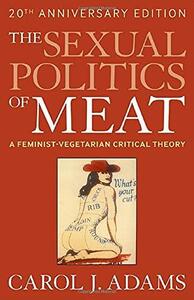Take a photo of a barcode or cover
194 reviews for:
The Sexual Politics of Meat (20th Anniversary Edition): A Feminist-Vegetarian Critical Theory
Carol J. Adams
194 reviews for:
The Sexual Politics of Meat (20th Anniversary Edition): A Feminist-Vegetarian Critical Theory
Carol J. Adams
challenging
informative
sad
slow-paced
Love the absent referent concept and the examination of violence. The literary analysis lost me at times — perhaps because I wasn’t familiar with all of the texts — but I loved, loved, loved the section on Frankenstein. Last few chapters got a bit slow/example-y (maybe because I think theory > history). The first few chapters were the best.
The argument lost me in a few places, but I loved the concept of the absent referent and the discussion of vegetarianism in classic literature. The chapter on Frankenstein's monster was excellent
informative
inspiring
sad
slow-paced
Amazing insights and creative connections are being made in this book. That cannot be unseen afterwards. The first chapters were my favourites.
challenging
informative
reflective
slow-paced
I was so disappointed in this book. I was expecting something much more nuanced, exploring the intersections of manliness, eating meat and sexism. However, that is not at all what I found here.
The main thesis of this book seems to be that there shouldn't be any hierarchy between humans and animals, that we should all be regarded equal. And here's the thing: I do not belive that. But I am a vegetarian, and I am against the general treatment of animals in our society, and I do believe things need to change in the meat industry. So I was open to being convinced by the author of her main thesis. I honestly was.
However, very early on she starts comparing violence against animals to violence against women. And that's kind of what I was expecting from this book, you know? How violence begets more violence. How men build their own identity through violence, and how meat might play a role in that. But what the author states is that violence against animals and violence against women are the same. That animals are exactly as oppressed as women, or even more so. And here's where the book lost me. Excuse me if I care much more about women being sexually abused or killed, something that still happens in alarming numbers to this day, than I care about animals. Honestly, I care about both, but isn't it sexist in itself to put women at the same level as animals?
Nevertheless, I tried to keep an open mind, and I kept reading and finished the book. But I don't think Adams ever tries to convince anyone of anything. She states her own opinions as facts, she picks very carefully every single argument that might prove her point, even when it doesn't make any sense. For example, she at one point mentions a group of Christian women who thought like her, and it's like: okay, what did they do for feminism? I honestly feel like she's using feminism as an excuse, all she cares about is the vegetarian aspect of this.
There are some interesting ideas in here that I did like. Her description of the "absent referent" is spot on. I love how she explains that vegetarianism and veganism have been portrayed as a temporary fad since the very beginning. But how can it be a fad if it started in the 19th century and here we still are? And it's so true. You see it even now, in the year 2020, it's still treated as something that people just got into and might grow out of. So that was interesting.
Another interesting aspect she does explore is the fact that, in novels where vegetarianism is a crucial aspect, that has usually been ignored by critics and scholars. That's something I hadn't thought about before, but I do believe she is right, and it's certainly an interesting approach to classics such as Frankenstein.
In one of the first chapters she also mentions the relationship between women's bodies and meat in advertising, and I really liked that, because that is the kind of analysis that I came to this book for. However, she then does put animals and women at the same level herself, so, as I mentioned, that made me lose interest.
So this was a bummer.
The main thesis of this book seems to be that there shouldn't be any hierarchy between humans and animals, that we should all be regarded equal. And here's the thing: I do not belive that. But I am a vegetarian, and I am against the general treatment of animals in our society, and I do believe things need to change in the meat industry. So I was open to being convinced by the author of her main thesis. I honestly was.
However, very early on she starts comparing violence against animals to violence against women. And that's kind of what I was expecting from this book, you know? How violence begets more violence. How men build their own identity through violence, and how meat might play a role in that. But what the author states is that violence against animals and violence against women are the same. That animals are exactly as oppressed as women, or even more so. And here's where the book lost me. Excuse me if I care much more about women being sexually abused or killed, something that still happens in alarming numbers to this day, than I care about animals. Honestly, I care about both, but isn't it sexist in itself to put women at the same level as animals?
Nevertheless, I tried to keep an open mind, and I kept reading and finished the book. But I don't think Adams ever tries to convince anyone of anything. She states her own opinions as facts, she picks very carefully every single argument that might prove her point, even when it doesn't make any sense. For example, she at one point mentions a group of Christian women who thought like her, and it's like: okay, what did they do for feminism? I honestly feel like she's using feminism as an excuse, all she cares about is the vegetarian aspect of this.
There are some interesting ideas in here that I did like. Her description of the "absent referent" is spot on. I love how she explains that vegetarianism and veganism have been portrayed as a temporary fad since the very beginning. But how can it be a fad if it started in the 19th century and here we still are? And it's so true. You see it even now, in the year 2020, it's still treated as something that people just got into and might grow out of. So that was interesting.
Another interesting aspect she does explore is the fact that, in novels where vegetarianism is a crucial aspect, that has usually been ignored by critics and scholars. That's something I hadn't thought about before, but I do believe she is right, and it's certainly an interesting approach to classics such as Frankenstein.
In one of the first chapters she also mentions the relationship between women's bodies and meat in advertising, and I really liked that, because that is the kind of analysis that I came to this book for. However, she then does put animals and women at the same level herself, so, as I mentioned, that made me lose interest.
So this was a bummer.
challenging
informative
reflective
medium-paced
challenging
informative
medium-paced
honestly, the first half was waaay better than the second half
i think the book kinda got lost halfway, and started being less feminist and more about the philosophy of writing (?), which was not what i subscribed to.
Anyway, the first half alone is worth it. i would say stop there tbh.
Only problem i had with it was that it was very white woman centric: it lacks nuance when it comes to BIPOC experiences with meat and veganism. we shouldn't let white people tell them how to be "ethical" regarding eating meat.
Anyway, i'd say it's a staple for every vegan and every feminist: it really hits the nail on the head.
I understand it may hit too close to home for non vegans, and put them on the fence.
I'd say go into it if you have read some more entry level and "kind" antispecisist books.
definitely not the "vegan bible" or "the feminist bible" in any way, just an interesting add to the conversation.
i think the book kinda got lost halfway, and started being less feminist and more about the philosophy of writing (?), which was not what i subscribed to.
Anyway, the first half alone is worth it. i would say stop there tbh.
Only problem i had with it was that it was very white woman centric: it lacks nuance when it comes to BIPOC experiences with meat and veganism. we shouldn't let white people tell them how to be "ethical" regarding eating meat.
Anyway, i'd say it's a staple for every vegan and every feminist: it really hits the nail on the head.
I understand it may hit too close to home for non vegans, and put them on the fence.
I'd say go into it if you have read some more entry level and "kind" antispecisist books.
definitely not the "vegan bible" or "the feminist bible" in any way, just an interesting add to the conversation.
challenging
funny
inspiring
reflective
sad
medium-paced
I wasn’t sure if I would manage to finish it, especially earlier in the book, as I felt it wasn’t really convincing. But, as I kept reading, I realized the idea was simply too complex to get it in a few pages. As it develops, it becomes clearer and once you see it, it can’t be unseen. Really interesting, even though it was a tough read.






